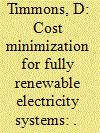| Srl | Item |
| 1 |
ID:
168642


|
|
|
|
|
| Summary/Abstract |
Climate change is the world's most prominent environmental problem, and fossil-fuel combustion is its primary cause. To set carbon reduction goals, policy makers require information on feasibility and cost of renewable energy systems. In this study, we describe an economic approach to modeling a national electricity system based entirely on renewable sources, using the island-nation of Mauritius as a case study.
|
|
|
|
|
|
|
|
|
|
|
|
|
|
|
|
| 2 |
ID:
166524


|
|
|
|
|
| Summary/Abstract |
Wind and solar power are predicted to dominate CO2 emission reductions in future electricity systems. Unlike spatially compact fossil fuels, harnessing renewable energy flows increases the land area impact of electricity production. This study quantifies the trade-offs between land area impacts, technology alternatives of decarbonisation pathways, and costs associated with reducing carbon emissions from electricity generation by ~ 90%.
|
|
|
|
|
|
|
|
|
|
|
|
|
|
|
|
| 3 |
ID:
168700


|
|
|
|
|
| Summary/Abstract |
Energy transitions in developing countries principally consist of the integration of renewable energies and energy efficiency in order to achieve a sustainability framework. Particularly, energy stakeholders are responsible for power planning to assure a country transition. Alongside, they are responsible for providing access to energy through system reliability. The objective of this paper is to demonstrate how a planned decrease of power system reliability, without impacting access to energy, could lead to a better integration of renewable energies. Therefore, we have linked an energy efficiency action, the peak clipping as scheduled outages, to the power system reliability factor. This factor has been integrated in the energy planning model, Open Source energy Modeling SYStem (OSeMOSYS) which is a cost-based long-term optimization model. Following, enhanced OSeMOSYS has been applied to the Tunisia power system using two scenarios reflecting renewable energy sources penetration. Simulation results showed a high rate of renewable energy sources penetration with a decrease of the power system reliability relying on energy efficiency actions.
|
|
|
|
|
|
|
|
|
|
|
|
|
|
|
|